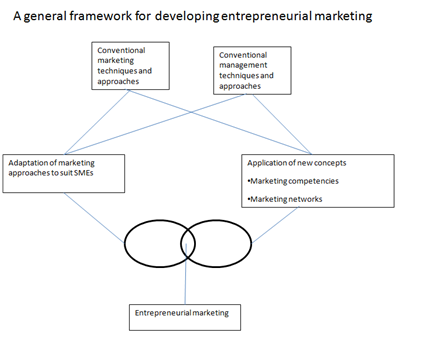What is Entrepreneurial Marketing?
Only in recent decades has the area of entrepreneurs and entrepreneurial marketing been researched.
Before then, Entrepreneurial Marketing was not considered to be any different from text book marketing. It was widely assumed, in academia, that SMEs just required a simplified version of the more ‘sophisticated’ marketing practices, used by the largest companies (Carson, Cromie, McGowan, & Hill, 1995).
One of my lecturers at Uni believed that Marketing was a codified form of entrepreneurship; a collection of models and methods which can be taught and implemented by large organisations, however Carson et al examined the traditional marketing techniques and argued that many are “inappropriate, wasteful and ineffective” for SMEs, especially when conducted in a general manner.
Models and methods
Many scales have now been devised to measure an Entrepreneurs’ marketing orientation. Narver and Slater (1990)’s model involves customer and competitor orientation and interfunctional co-ordination and is customer focused, whereas Kohli and Jaworski’s (1990) which contains intelligence generation, intelligence dissemination and responsiveness, is more about how the information is used.
Blankson et al (2006) studied a selection of small businesses and revealed that they had a unique marketing style, with a strong emphasis on customer care and employee welfare, motivation and market intelligence. Even though it is not text book marketing, Blankson et al (2006) believed it fitted with their modus operandi. Sashittal and Jassawalla (2001) believed that this was the central defining feature of the implementation process and planning, which ultimately determines the small firm’s market orientation.
Carson et al (1995)’s framework
The above model takes conventional marketing and management techniques and approaches and applies marketing competencies and marketing networks and adapts the approach to suit the SME, which produces entrepreneurial marketing.
This framework has a significant emphasis on Personal Contact Networks (PCN).
PCNs are networks of individuals and organisations that an entrepreneur is in contact with. These can be strong ties – friends or relations who can blindside by saying ideas are great because they love you, or weak ties – which tend to be more casual acquaintances; personal and business, that don’t care for feelings, have a range of skills and interests and can broaden horizons.
Attending Networking events is a great way for Entrepreneurs to build PCNs and Linkedin is an effective tool to manage them. Most large businesses have competitors, this is because of their occupation of market share domination. However, each small business, even if going after the same market, will have different approaches and experience and can each offer something different.
Small businesses don’t have budgets to invest in market research which can limit the information available but SMEs can use PCNs to overcome this by gathering this information in a different way. Carson et al (1995) believe that SMEs consult with various PCNs while making business decisions; in many cases these consultations are simply informal conversations and exchanges of information. Product testing, focus groups and perception are all areas of marketing research with which PCNs can assist.
I believe that just because traditional models and methods are not used, it doesn’t mean that Entrepreneurs are not Marketing orientated. Networking events and Linkedin are great ways for Entrepreneurs to manage and build their Personal Contact Networks of Weak Ties and provide an invaluable source of intelligence building, dissemination and response.
I also believe that if an Entrepreneur is responsive to their Market, which many I have come across are, then they are Marketing Orientated.
What do you think Entrepreneurial Marketing is?


I’m doing a lot of Personal Contact Networking at the moment and I use Linked in alongside it so does this mean I might be getting something right?
Absolutely, but what are you using it for? Are you doing it to simply increase the number of people you are in contact with, or do you test ideas and get advice from them as well?
Thanks Merewyn – certainly makes you think. My marketing is for raising awareness and educating about the VA world.
Really interesting to read the different models and methods for marketing. I would agree LinkedIn is great for building contacts and asking for advice from others with the expertise, as there is such a wide range within my contacts. I’ve used it as a marketing tool and to follow up on people and to arrange various events etc. Thanks Merewyn, real food for thought!
Thanks Merewyn,
This puts things very clearly, it is so easy to lose focus when going out to networking events etc.
Thanks Merewyn, loved the model, and I’m always eager to learn about marketing as it’s such an essential part of business.